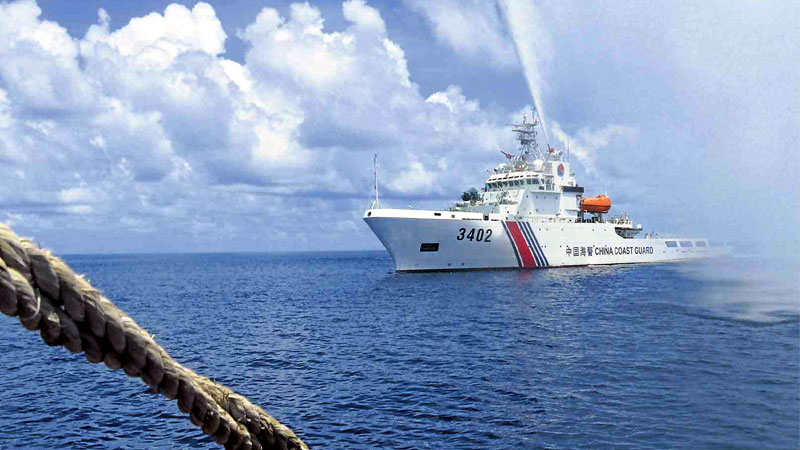
SEA DISPUTE In this photo taken on Sept. 23, 2015, a Chinese Coast Guard vessel fires its water cannon on Filipino fishermen in a confrontation off Scarborough Shoal in the West Philippine Sea. A UN court is expected to issue a ruling today on a complaint filed by the Philippines questioning China’s territorial claim over almost all of the sea, including its reefs, shoals and islets. AP
BEIJING — Ahead of Tuesday’s ruling on the Philippines’ arbitration case, Chinese law experts claim that the tribunal has handled the case irresponsibly.
The arbitration tribunal in the South China Sea dispute has explained the case in an irresponsible way and set a bad precedent, according to law professionals and scholars on international law from around the world.
The decision in the case, which was initiated unilaterally by the Philippines despite China’s objection, is to be announced on Tuesday by the Arbitral Tribunal at The Hague.
READ: #InquirerSeven FAQ about the Philippines vs. China arbitration case
Abdul Gadire Koroma, a Sierra Leonean who served two terms as judge at the International Court of Justice, said “the tribunal is not entitled to decide” questions concerning territorial sovereignty.
Myron Nordquist, a senior fellow at the Center for National Security Law at the University of Virginia School of Law, said “the arbitration sets a bad precedent with its award on jurisdiction.”
“There is no way to guarantee the effectiveness of the Article 298 declarations except to honor the text which, despite my deep respect for the tribunal members and their good faith, was not done in this arbitration,” said Nordquist.
Article 298 of the United Nations Convention on the Law of the Sea excludes compulsory arbitration on issues including maritime boundaries. In 2006, China declared it would exercise its rights under Article 298.
“They have already shown so much prejudice (against China),” Nordquist said.
In an earlier interview with China Daily, Nordquist also said he thought the United States is behind the Philippines’ efforts to stir up the situation.
“They want to get back to those military bases. You know they got kicked out of quite a few of those places.”
He said the ruling is likely to be bad for China. “It’s not going to end the problem. It’s going to exacerbate it.”
“I am just not happy. I don’t think China is getting a fair shake. I think part of the reason is that people that are being paid a lot of money by the Filipinos are taking advantage of the ignorance of people about this very complicated area.”
Keyuan Zou, Harris professor of International Law at the University of Central Lancashire in the United Kingdom, said Article 298 of the UNCLOS gives the parties concerned the right to exclude some disputes from compulsory jurisdiction.
Zou said that since the case essentially concerns sovereignty and delimitation, “the Philippines used plenty of arguments, trying to convince the tribunal that the disputes they characterised are not excluded”.
“Surprisingly, the tribunal has sided completely with the Philippines and explained the matter in a very loose and irresponsible way,” Zou said.
This “created a very bad precedent, disrespecting the dignity of nation states and damaging the spirit of the rule of law,” he said.
“If the official declarations made by nation states are so easily trumped by several individuals, the world legal order would become chaotic. One of the negative impacts could be that the United States is even more reluctant to join the UNCLOS.” The United States has not ratified the UNCLOS.
A column published by the Philippine Star on July 10 said the arbitration “did look like an American ploy to internationalize the dispute.”
It said that under the Aquino administration, the Philippines failed to devise an independent foreign policy and has been a subordinate “of the US in foreign-policy making.”
In Beijing, the foreign ministry said on Monday that additional countries have announced their support for China’s stance on the South China Sea.
Lu Kang, the ministry’s spokesman, told a regular media briefing that countries such as Cambodia, Angola, Liberia, Madagascar, Papua New Guinea and Senegal made such announcements recently.
“More and more countries have voiced their position publicly despite pressure. That strongly proves that people have a sense of natural justice, while righteousness is widely supported,” he said.
RELATED STORIES
Beijing raises rhetoric ahead of South China Sea ruling
How will the arbitral tribunal verdict on the PH vs China case be issued?
RELATED VIDEOS

